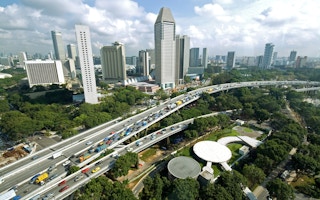Using Airbnb for the first time in December, I booked an apartment at Gare du Nord – right in the heart of Paris – for S$1,800 for nine days. It was no swanky hotel, mind you, but the apartment was a steal for its location.
To continue reading, subscribe to Eco‑Business.
There's something for everyone. We offer a range of subscription plans.
- Access our stories and receive our Insights Weekly newsletter with the free EB Member plan.
- Unlock unlimited access to our content and archive with EB Circle.
- Publish your content with EB Premium.
Decent rooms would have cost us at least S$500 per night for my team of three instead of S$200, thanks to the United Nations climate change meeting which we were attending. Our host, a French Canadian advertising executive named Eric, was on a business trip the entire time we were there. (That’s why we could have his apartment.)
But even though we did not meet, he and I have struck up a friendship over countless emails discussing the merits of the eating establishments near his apartment. We now have a standing invite to visit each other in our countries.
As transactions go, this was a win-win for all parties, and also one of the many reasons why the sharing economy has gained global traction in recent years. PricewaterhouseCoopers expects the industry to grow exponentially from US$15 billion today to US$335 billion by 2025.
Put simply, the sharing economy favours access over ownership, and achieves this through peer-to-peer networks that facilitate the sharing of goods and services.
It was named by Time magazine in 2011 as one of 10 ideas that would change the world. And indeed, its impact has reverberated across countries and disrupted entire industries from transportation to hospitality and rental markets.
American sharing economy expert April Rinne, who spoke in Singapore last month on the topic, gives a historical perspective. She notes that prior to the 19th century, people shared everything from infrastructure to goods to labour. Communities were hyper-local, based on trust and reciprocity, and did not require much technology, she explains.
Then the Industrial Revolution happened and consumer mass marketing proliferated the “take, make, waste” economic model, enabling people to “own their own stuff”. But in the process, it also broke up old systems of sharing, she says.
She notes that the advent of the Internet, which allowed people to connect in unprecedented ways, then led to the sharing economy, which has since “repaired this damage” by creating new relationships and social value.
The statistics back that up. A 2014 Nielsen poll of 30,000 people in 60 countries found that 68 per cent of global consumers are willing to share their assets and 66 per cent are willing to seek shares from others.
The sharing economy is popular because of its myriad benefits.
It generates economic activity by enabling people to share and earn income from underused assets such as cars, apartments or tools. It reduces environmental impact by minimising consumption and extending the lease of life of goods, and also promotes convenience as well as relationship-building.
With all these obvious benefits, it is surprising that the sharing economy has been relatively slow to take off in Singapore – especially given the ripe conditions of being a dense population with a high internet penetration.
Sure, the global posterchilds of the sharing economy – Airbnb, Uber – have already set up shop here, and we have seen homegrown enterprises such as iCarsClub (shared cars), PandaBed (shared beds) and Rent Tycoon (shared daily items) grow in recent years.
But if you look at cities such as South Korea’s Seoul or London in the UK, for instance, it’s obvious that Singapore is missing a trick.
Rinne cites some well-known examples. In Seoul, the city government has embraced the sharing economy and is using it to deliver public services, trigger economic activity, reduce waste and build communities.
For instance, it has harnessed technology to open up more than 700 underused public buildings to the public during idle hours for meetings and community events, which today have been used 23,000 times by residents.
In Britain, which is regarded as the European capital of the sharing economy, the government announced a raft of sharing economy initiatives in last year’s Budget. A new trade body, Sharing Economy UK, has been set up to champion the sector.
Of course, the sharing economy has attracted its share of controversies, which is why some governments across the world have been slow and cautious. Critics say some sharing economy businesses violate regulations, evade taxes, displace traditionally secure jobs and facilitate labour exploitation.
These are all valid concerns, but the approach should be to tackle these challenges head on, not abandon the sharing economy altogether.
Critics say some sharing economy businesses violate existing regulations, evade taxes, displace traditionally secure jobs and facilitate labour exploitation. These are all valid concerns, but the approach should be to tackle these challenges head on, not a reason to abandon the sharing economy altogether.
The world’s leading cities - Amsterdam, Seoul, San Francisco and London, to name a few - have passed laws to address these issues and to regulate sharing economy activity.
“
I believe the sharing economy is a key part of the Smart Nation vision to deploy technology to increase sustainability, deliver better services and improve the quality of life for citizens.
It also has natural overlaps with national efforts to promote entrepreneurship and social enterprises.
In Singapore, the Urban Redevelopment Authority (URA) conducted a public consultation exercise a year ago on the short-term rentals of properties - currently, HDB prohibits anyone from renting out a space in HDB flats for less than a six-month period, and URA has a similar guideline for private properties, but they have been silent otherwise.
The Land Transport Authority is also currently reviewing regulations for the transport industry, which has faced major upheaval in recent years with the entry of new taxi providers such as Uber and GrabTaxi. We have yet to find out what shape these rules will take.
In policymaking, Singapore can learn from Seoul’s sharing city strategy, which is centred on changing outdated laws and systems, supporting sharing enterprises and encouraging citizen participation.
One key approach would be to work in consultation with all stakeholders - including those affected and those who cause the disruption - to identify the benefits and desired outcomes for Singapore, then create rules to help realise them. Attention should also be paid to access to technology.
I believe the sharing economy is a key part of the Smart Nation vision to deploy technology to increase sustainability, deliver better services and improve the quality of life for citizens. It also has natural overlaps with national efforts to promote entrepreneurship and social enterprises.
For starters, the Government - perhaps within the Smart Nation Programme Office - can set up a unit specifically tasked to look at national sharing economy initiatives, and study the policies and regulations needed to shape the type of economy we want.
For businesses, civic society and individuals, the sharing economy presents unparalleled opportunities to create new revenue streams, solve social challenges and build community resilience.
The Sharing Economy Association Singapore – a new group set up to promote the idea locally – wants to see the government move quickly to amend laws. Its founder, Eugene Tay, also suggests applying it in the B2B (business-to-business) and G2G (government-to-government) space so that businesses with underused equipment and assets can share with other companies; and government agencies can do likewise.
If achieved, this can deliver a huge boost to Singapore’s productivity levels – a goal that has eluded us so far despite huge outlays in taxpayer money.
One day soon, I hope to be able to rent out my spare room on Airbnb – like Eric - without getting into trouble with the authorities. By then, I also hope Singapore will be known as a sharing society.
The possibilities are both endless and within our reach.
An abridged version of this column was first published in The Straits Times.









